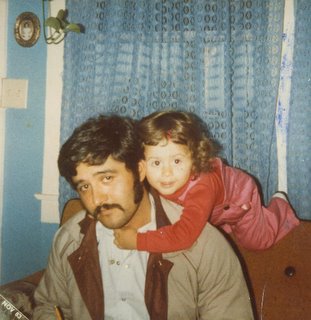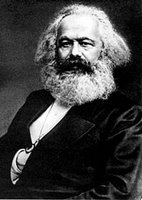Who's Your Daddy?
I read an article by John Gottman on The Edge website and it will provide fodder for my next few blog entries. He’s a psychologist that works with couples on improving their relationships. But with a background in mathematics, he’s as much an empiricist as he is a therapist – a good combination, if you ask me. Anyhow, this article was basically a distillation of his research to date and a summary of what he hopes to accomplish in the next 10 years or so.
He pointed out that back in the 1950’s fathers were not allowed to be in the delivery room for the birth of their child. These days, their presence is encouraged and is growing to be the rule. This is just one sign that fathers are taking a more active role in the rearing of their young. Unlike in the past, a father’s duty no longer terminates at being a provider. There is growing social pressure to be a dad, too.
 What will be the ramifications of this social movement? Gottman suggests that it will end wars. This position seems a little extreme, but not entirely implausible. The theory goes that fathers will be less reluctant to send their kids off to war, having invested so much time and energy into rearing them for 18 years. In the 1950’s, it was common for disengaged fathers to encourage their kids to be like Joe DiMaggio or Ted Williams and go join the war effort. They had only a small investment in the upbringing of their child, and consequently, less to lose. My dad, in contrast, who was very involved in my upbringing, would never encourage me to fight in a war. He’d be too afraid of losing me. Will this grow to be the rule? Not sure. At the very least, it’s a long shot, but wouldn’t that be nice?
What will be the ramifications of this social movement? Gottman suggests that it will end wars. This position seems a little extreme, but not entirely implausible. The theory goes that fathers will be less reluctant to send their kids off to war, having invested so much time and energy into rearing them for 18 years. In the 1950’s, it was common for disengaged fathers to encourage their kids to be like Joe DiMaggio or Ted Williams and go join the war effort. They had only a small investment in the upbringing of their child, and consequently, less to lose. My dad, in contrast, who was very involved in my upbringing, would never encourage me to fight in a war. He’d be too afraid of losing me. Will this grow to be the rule? Not sure. At the very least, it’s a long shot, but wouldn’t that be nice?
What are some other things that might happen in the next 50 years if fathers continue to be involved in the rearing of their children? I’m coming to realize that there’s a profound rift between the sexes in terms of the way people express themselves, the emotions they feel, and the ways they interact socially. Some of these differences are biological and some are, undoubtedly, social constructs. As fathers take on larger roles with the rearing of their children, I predict that we might see a narrowing of the gap in terms of the socially constructed sex roles.
 Indulge me while I play sociologist for the next few paragraphs. In the 1950’s, daughters would identify with their mothers and acquire their social roles through observational learning. But sons, without father figures to guide them, were left only to reject all that is feminine. The result was a man that was a caricature of masculinity. This caricature was reinforced as boys found their role models in the uber-manly characters of movies, comic books, and television. Sons and daughters grew polarized and the rift between them deepened.
Indulge me while I play sociologist for the next few paragraphs. In the 1950’s, daughters would identify with their mothers and acquire their social roles through observational learning. But sons, without father figures to guide them, were left only to reject all that is feminine. The result was a man that was a caricature of masculinity. This caricature was reinforced as boys found their role models in the uber-manly characters of movies, comic books, and television. Sons and daughters grew polarized and the rift between them deepened.
But, with fathers taking an active role, daughters will start to prize the ideals of their fathers. Conversely, fathers will grow sensitive to issues faced by their daughters and will gain appreciation for women’s issues. They will then be able to pass on this knowledge to their sons. Fathers will care about the future of their daughters and push for greater equality in the workplace both in terms of leadership opportunity and pay. Also, sons will have a much better role model – their own more sensitive father. This will be a more realistic ideal than super-heroes from comic books and cartoons. In a way, girls will learn to be more ‘manly’ and boys will learn to be more ‘feminine’ and we will see a softening of the sexes.
The liberalization of society will hasten as a greater emphasis will be placed on education of our youth. Elementary school teachers will receive greater appreciation and more men will take part in this traditionally female occupation. As more money is poured into education, teachers will be paid better, too.
We’ll have less teenage pregnancy.
Cars will be smaller as men will no longer feel the need to drive larger than life vehicles like in comics or movies. Their dad’s station wagon will be big enough. Ha!
Athletes will not be paid as well. Little boys will no longer have to worship sports stars in place of their fathers. Every boy in an inner city will no longer see sports as his only mode of advancement. Being a ______, just like his dad will be ok, too. In fact, it will be better.
More and more people will have the suffixes Jr, III, and IV.
 Rappers will no longer be all about the bling-bling. They’ll rap about hugs and ponies too.
Rappers will no longer be all about the bling-bling. They’ll rap about hugs and ponies too.
Soap operas will have broader appeal. (Hey, it can’t all be good!)
"I Love Dad" tatoos will briefly become the fad and will replace "I Love Ma" as the preferred option among male sailors and bikers and female CEOs.
And finally, the cowboy boot will be replaced by more practical footwear.
He pointed out that back in the 1950’s fathers were not allowed to be in the delivery room for the birth of their child. These days, their presence is encouraged and is growing to be the rule. This is just one sign that fathers are taking a more active role in the rearing of their young. Unlike in the past, a father’s duty no longer terminates at being a provider. There is growing social pressure to be a dad, too.
 What will be the ramifications of this social movement? Gottman suggests that it will end wars. This position seems a little extreme, but not entirely implausible. The theory goes that fathers will be less reluctant to send their kids off to war, having invested so much time and energy into rearing them for 18 years. In the 1950’s, it was common for disengaged fathers to encourage their kids to be like Joe DiMaggio or Ted Williams and go join the war effort. They had only a small investment in the upbringing of their child, and consequently, less to lose. My dad, in contrast, who was very involved in my upbringing, would never encourage me to fight in a war. He’d be too afraid of losing me. Will this grow to be the rule? Not sure. At the very least, it’s a long shot, but wouldn’t that be nice?
What will be the ramifications of this social movement? Gottman suggests that it will end wars. This position seems a little extreme, but not entirely implausible. The theory goes that fathers will be less reluctant to send their kids off to war, having invested so much time and energy into rearing them for 18 years. In the 1950’s, it was common for disengaged fathers to encourage their kids to be like Joe DiMaggio or Ted Williams and go join the war effort. They had only a small investment in the upbringing of their child, and consequently, less to lose. My dad, in contrast, who was very involved in my upbringing, would never encourage me to fight in a war. He’d be too afraid of losing me. Will this grow to be the rule? Not sure. At the very least, it’s a long shot, but wouldn’t that be nice?What are some other things that might happen in the next 50 years if fathers continue to be involved in the rearing of their children? I’m coming to realize that there’s a profound rift between the sexes in terms of the way people express themselves, the emotions they feel, and the ways they interact socially. Some of these differences are biological and some are, undoubtedly, social constructs. As fathers take on larger roles with the rearing of their children, I predict that we might see a narrowing of the gap in terms of the socially constructed sex roles.
 Indulge me while I play sociologist for the next few paragraphs. In the 1950’s, daughters would identify with their mothers and acquire their social roles through observational learning. But sons, without father figures to guide them, were left only to reject all that is feminine. The result was a man that was a caricature of masculinity. This caricature was reinforced as boys found their role models in the uber-manly characters of movies, comic books, and television. Sons and daughters grew polarized and the rift between them deepened.
Indulge me while I play sociologist for the next few paragraphs. In the 1950’s, daughters would identify with their mothers and acquire their social roles through observational learning. But sons, without father figures to guide them, were left only to reject all that is feminine. The result was a man that was a caricature of masculinity. This caricature was reinforced as boys found their role models in the uber-manly characters of movies, comic books, and television. Sons and daughters grew polarized and the rift between them deepened.But, with fathers taking an active role, daughters will start to prize the ideals of their fathers. Conversely, fathers will grow sensitive to issues faced by their daughters and will gain appreciation for women’s issues. They will then be able to pass on this knowledge to their sons. Fathers will care about the future of their daughters and push for greater equality in the workplace both in terms of leadership opportunity and pay. Also, sons will have a much better role model – their own more sensitive father. This will be a more realistic ideal than super-heroes from comic books and cartoons. In a way, girls will learn to be more ‘manly’ and boys will learn to be more ‘feminine’ and we will see a softening of the sexes.
The liberalization of society will hasten as a greater emphasis will be placed on education of our youth. Elementary school teachers will receive greater appreciation and more men will take part in this traditionally female occupation. As more money is poured into education, teachers will be paid better, too.
We’ll have less teenage pregnancy.
Cars will be smaller as men will no longer feel the need to drive larger than life vehicles like in comics or movies. Their dad’s station wagon will be big enough. Ha!
Athletes will not be paid as well. Little boys will no longer have to worship sports stars in place of their fathers. Every boy in an inner city will no longer see sports as his only mode of advancement. Being a ______, just like his dad will be ok, too. In fact, it will be better.
More and more people will have the suffixes Jr, III, and IV.
 Rappers will no longer be all about the bling-bling. They’ll rap about hugs and ponies too.
Rappers will no longer be all about the bling-bling. They’ll rap about hugs and ponies too.Soap operas will have broader appeal. (Hey, it can’t all be good!)
"I Love Dad" tatoos will briefly become the fad and will replace "I Love Ma" as the preferred option among male sailors and bikers and female CEOs.
And finally, the cowboy boot will be replaced by more practical footwear.

3 Comments:
hey did you read that CNNHealth article on the pills that make you forget traumatic experiences? thought it would be interesting blog fodder... ;)
A world with more involved fathers just means that young men will hate them that much more.
It's Oedipal.
couldnt find the cnn article. maybe it's because i dont know how to use cnn.com. i hardly ever read the news you know.
the first movement is to hate your father because your mother directs affection to him and, consequently, away from you. the second movement is to want to be like him, so you can recapture the lost affection. sons are quite like their fathers, far more so than they would ever admit. if nothing else, you've got 50% of his genes. that would be a lot to overcome, like him or not.
Post a Comment
<< Home